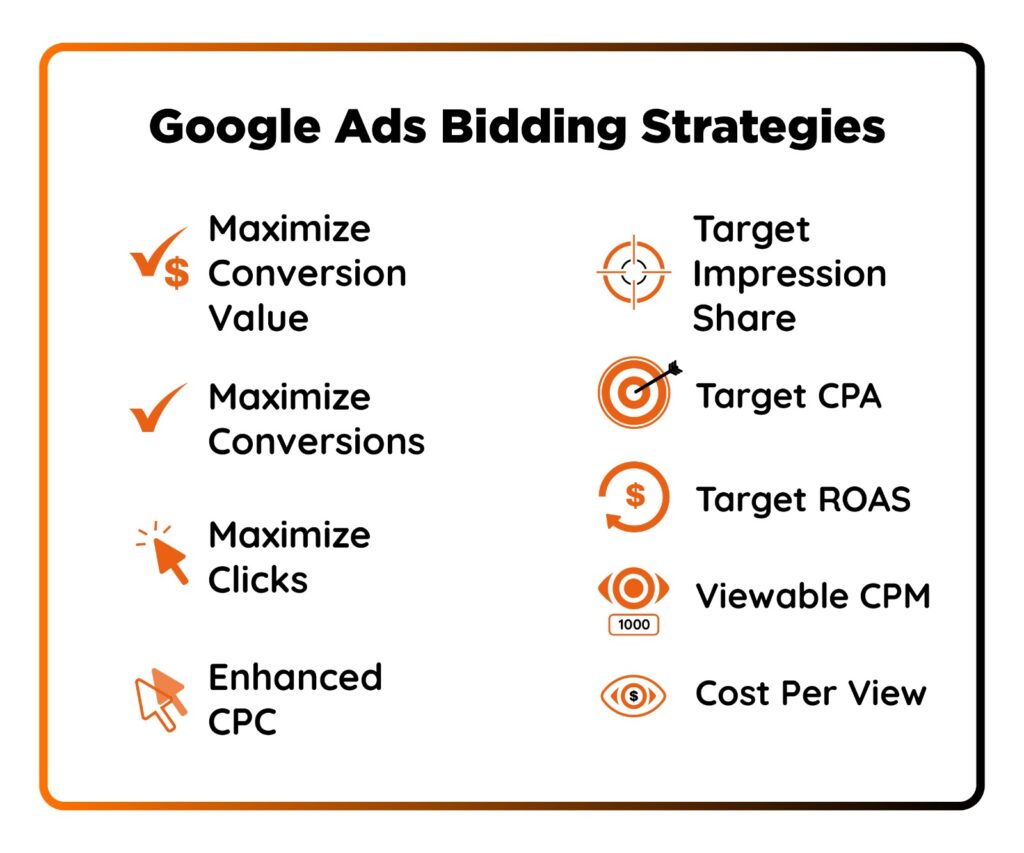Blog Details

The Ultimate Guide to Bidding Strategies for Google Ads
Understanding bidding strategies is crucial for a successful Google Ads campaign in the constantly changing digital advertising arena. Proficiency in bidding intricacies significantly impacts campaign performance, visibility, and ultimately, the return on investment (ROI). With a range of bidding options at hand, strategic navigation through them is essential to maximize ad spend efficiency and attain your advertising objectives.
Understanding Bidding Strategies

The techniques used to determine bids for ad spots in the auction-based system are referred to as bid strategies in Google Ads. Winning auctions for desirable ad placements is the aim, and it must be done so in order to keep a healthy cost per acquisition (CPA) or return on advertising spend (ROAS). The following are important bid tactics to take into account:
1. Manual Bidding
Manual bidding provides full control over individual keyword bids. Advertisers can set specific bids for keywords based on their goals and results with this hands-on approach. Experienced advertisers who desire direct control over their bids and a more detailed strategy will find it ideal.
2. Automated Bidding
Automated bidding leverages machine learning and data algorithms to optimize bids automatically based on predetermined goals. Google offers various automated bidding strategies like Target CPA (Cost Per Acquisition), Target ROAS (Return on Ad Spend), Maximize Conversions, and Enhanced Cost Per Click (ECPC). These strategies use historical data to predict optimal bids for better campaign performance. Let’s learn these bidding styles one by one:
· Target CPA (Cost Per Acquisition)
Target CPA bidding serves as a strategy for enhancing conversions within your campaign. If your main aim is to drive conversions, opting for Target CPA bidding directs efforts toward converting users at a designated acquisition cost. Under this approach, Google Ads autonomously adjusts your campaign bids according to your specified CPA.
While certain conversions incur higher costs, others are less expensive, ultimately balancing out to align with your acquisition objectives.
· Target ROAS (Return on Ad Spend)
Target ROAS is a bidding strategy utilized by Google Ads to adjust your bids with the aim of maximizing the value of conversions in relation to the return you desire from your ad expenditure. This figure is calculated as a percentage.
Before opting for this bidding method, ensure that you’ve set your daily budget at a level you’re comfortable spending. At the conclusion of your campaign, assess your return on investment to determine if maximizing conversions resulted in profitable sales. With this strategy, during setup, you won’t need to input any additional details besides your daily budget.
· Maximize Conversions
The maximize conversion value strategy stands as the most recent bidding strategy available on the platform. It operates akin to Target ROAS, where the Google Ads algorithm endeavors to maximize the return on your ad expenditure.
However, the key distinction lies in the fact that you’re not required to specify a target ROI; instead, you allow the algorithm to optimize your entire ad spend to the best of its capabilities.
· Enhanced Cost Per Click (ECPC)
ECPC is a hybrid bidding strategy that combines manual bidding with automatic adjustments. It allows advertisers to set manual bids while enabling Google to adjust bids in real-time for clicks that are more likely to result in conversions
Keyword Bidding Strategy

Selecting the right bidding strategy for keywords is crucial for a successful campaign. Here’s a breakdown of keyword bidding strategies:
1. Broad Match
Bidding on broad match keywords allows your ads to appear for searches that include variations, synonyms, and related searches to the specified keyword. While broad match offers wider reach, it may lead to irrelevant clicks. Monitoring and refining the keyword list is vital in this strategy.
2. Phrase Match
When a search query contains the exact phrase or a very similar variation, phrase match keywords display advertisements. It still reaches a larger audience but offers greater control than broad match. This tactic guarantees that advertisements appear for more pertinent queries.
3. Exact Match
Only when the search query exactly matches the defined keyword or one of its close variants do advertising appear for exact match keywords. Although it may have a limited reach, this method delivers the highest relevance. It works well for focusing on audiences who are more likely to convert.
Click Bidding
Click bidding involves the amount an advertiser is willing to spend on each click their ad receives. It plays a pivotal role in determining ad positions in the search results. The visibility of an ad is influenced by various factors like keyword competition, quality score, and the bid amount.
Best Practices for Effective Bidding Strategies

1. Understand Your Goals
Identify your campaign objectives whether it’s maximizing clicks, generating leads, driving conversions, or achieving a specific ROAS. Align your bidding strategy with these goals.
2. Conduct Keyword Research
Thorough keyword research helps in identifying relevant keywords with appropriate bid values. Understand search volume, competition, and user intent behind each keyword.
3. Monitor and Adjust
Regularly monitor campaign performance metrics like click-through rates (CTR), conversion rates, and cost-per-click (CPC). Adjust bids based on performance to optimize results.
4. Utilize Ad Scheduling
Use ad scheduling to adjust bids for specific days or times when your target audience is most active. This allows for more efficient allocation of budget.
5. Test Different Strategies
Experiment with different bidding strategies to determine which ones work best for your campaign objectives and budget.
Mastering bidding strategies in Google Ads is an ongoing process that requires constant monitoring, analysis, and adaptation. Choosing the right bidding strategy tailored to your campaign goals and audience is pivotal for success. By leveraging the available bidding options effectively and keeping abreast of industry updates, advertisers can optimize their ad campaigns for maximum impact and ROI.
A digital marketing company may maximize campaign performance by learning Google Ads bidding tactics. Ensure the success of your campaigns with this comprehensive book, which reveals insights essential for successful bidding tactics.

0 Client’s Comments